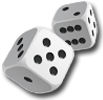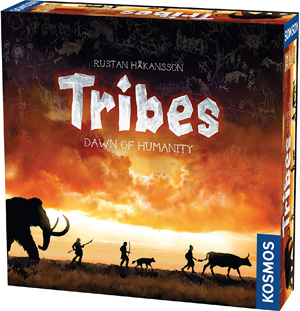



play board games
Board game reviews, strategy tips & session reports
Tribes: Dawn of Humanity Board Game Review
 Stats:
Stats:
No. of players: 2-4
Amount of time to play: 45-60 min
Age requirements: 10+
Set-up time: 5 min
Tribes: Dawn of Humanity is a straightforward board game that is great for new gamers and families.
Tribes: Dawn of Humanity Rules Description:
You start Tribes: Dawn of Humanity with some meeples and marking stones, five shells and your own board made up of three hex tiles. There is a central board with some advancements, events and progress tracks. You shuffle the six action tiles and place them next to each other by the board. After you place one of your meeples on one of your starting hexes the game begins.
On your turn you must take the leftmost action tile and perform its action. If you wish to take a different action tile, you place shell on every tile you skip, starting from the leftmost one. If you take a tile that has shells on it they are yours to use later in the game.
There are three actions in the game: Procreate, Move and Explore. When you take the Procreate action you add meeples based on your progress (I’ll get to that soon) to spaces that already contain a meeple. The Move action lets you move your meeples around your map. And the Explore action lets you draw tiles from a bad to add to your map.
Each of the three actions is on two of the action tiles. One has just the action. The other also shows a hand icon. These tiles are used to complete an achievement. You do not get to do both actions with this one tiles and must choose which to perform.
Achievements require you to have meeples on a specific hex type to complete. You mark the achievement with one of your marking stones and score Vps equal to the number on the space. Each achievement may only be claimed once per game by each player. The achievement will increase your progress in one of the three other actions making them more powerful. Some claim spaces are marked with a lightning bolt. These add an event tile to the right end of the action tiles. They are resolved when selected from the row.
For example, the Hunting achievement requires you have one meeple on one Goat hex. It lets you move your explore marker up the progress track. Moving forward when you Explore you draw two tiles. Let’s say you are the first player to claim the Hunting achievement. It scores you two VPs and adds an event to the action tiles.
There are three levels of achievements and each requires more of one type of terrain to claim. You must also have the first level of an achievement to gain the one above it. If you do not have the terrain type needed for an achievement you may use any tile with a meeple on it, but must flip it facedown.
Event tiles may be good or bad depending on who triggers them and where you are on the progress tracks. The last of which is the Strength meter. Unlike the other progress bar this one only helps when events are triggered.
Once two to four third level events are resolved (based on the number of players) the game ends. You get additional VPs if you get to certain levels on the progress tracks, for having the most meeples in play, and for having the most land tiles.
Quick Review of Tribes: Dawn of Humanity:
Tribes: Dawn of Humanity is a fun gateway game. It is simple, light-weight Eurogame that is easy to teach and great for kids. It is easy to see how the choices you make result in VPs.
The components for this game are great. Everything looks great and is well made too. The rules are easy to read and follow with plenty of examples.
This game is very smooth. Everything just works really well together. It doesn’t do anything new on innovative, but it plays quick and can be enjoyed by anyone. It is easy to set up, easy to explain and teach and easy to play.
I am not sure Tribes: Dawn of Humanity is for everyone. Experienced gamers might want more depth or complexity. It seems the designer knows this. You can find a printable expansion here. And there are supposedly more expansions in his head.
If you are looking for an action-selection gateway game or lighter board game to play with kids, Tribes: Dawn of Humanity is a good one.
Score and synopsis: (Click here for an explanation of these review categories.)
Strategy 3 out of 6
Luck 4 out of 6
Player Interaction 3 out of 6
Replay Value 4 out of 6
Complexity 2 out of 6
Fun 4 out of 6
Overall 3 (4 if buying as a gateway game) out of 6

Leave a Reply